1906 Intercalated Games
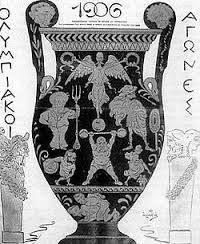 | |
| Host city | Athens, Greece |
|---|---|
| Nations participating | 20 |
| Athletes participating |
854 (848 men, 6 women)[1] |
| Events | 78 in 13 sports |
| Opening ceremony | April 22 |
| Closing ceremony | May 2 |
| Officially opened by | George I of Greece |
| Stadium | Panathenaic Stadium |
The 1906 Intercalated Games or 1906 Olympic Games was an international multi-sport event that was celebrated in Athens, Greece. They were at the time considered to be Olympic Games and were referred to as the "Second International Olympic Games in Athens" by the International Olympic Committee.[2] Whilst medals were distributed to the participants during these games, the medals are not officially recognized by the IOC today[3] and are not displayed with the collection of Olympic medals at the Olympic Museum in Lausanne, Switzerland.
Origin
The first Intercalated Games had been scheduled by the International Olympic Committee in 1901 as part of a new schedule, where every four years, in between the internationally organized games, there would be intermediate games held in Athens. This was apparently a compromise: after the successful games of Athens 1896, the Greeks suggested they could organize the games every four years. Since they had the accommodation and had proven they could hold well-organized games, they received some support. However, Pierre de Coubertin, the founder of the International Olympic Committee, opposed this. Coubertin had intended the first games to be in Paris in 1900. After Paris lost the premiere Olympics, Coubertin did not want the games to be permanently hosted elsewhere.
When these games turned out less than perfect and were overshadowed by the Exposition Universelle, the IOC supported the Greek idea by granting them a second series of quadrennial games in between the first series. All of the games would be International Olympic Games; the difference was that half of them would follow Coubertin's idea of "organisation internationale", while the other half would follow the Greeks' idea of a permanent home with the Greek NOC as experienced organizers. This was a departure from the ancient schedule, but it was expected that, if the ancient Greeks could keep a four-year schedule, the modern Olympic Movement could keep a two-year schedule. As 1902 was now too close, and Greece experienced internal difficulties, the 2nd Olympic Games in Athens were scheduled for 1906. The IOC as a whole gave the Greek NOC full support for the organization.
First Intercalated Games
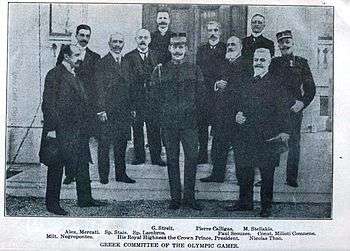
The 1906 games were quite successful. Unlike the 1900, 1904 or 1908 games, they were neither stretched out over months nor overshadowed by an international exhibition. Their crisp format was most likely instrumental in the continued existence of the games.
These Games also were the first games to have all athlete registration go through the NOCs. They were the first to have the Opening of the Games as a separate event: an event at which for the first time the athletes marched into the stadium in national teams, each following its national flag. They were also the first with an Olympic Village, at the Zappeion. They introduced the closing ceremony, the raising of national flags for the victors, and several less visible changes now accepted as tradition.
Games
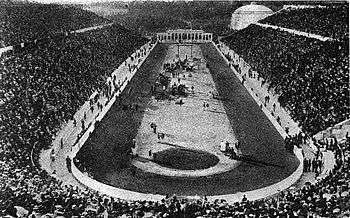
The Games were held from 22 April to 2 May 1906, in Athens, Greece. They took place in the Panathenaic Stadium, which had already hosted the 1896 Games and the earlier Zappas Olympics of 1870 and 1875. The games excluded several disciplines that had occurred during the past two games; it was unclear whether they ought to have been part of the Olympic Games. Added to the program were the javelin throw and the pentathlon.
Opening
The games included a real opening ceremony, watched by a large crowd. The athletes, for the first time, entered the stadium as national teams, marching behind their flags. The official opening of the games was done by King Georgios I.
Highlights
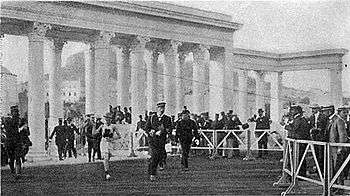
- There were only two standing jump events in Athens, but Ray Ewry successfully defended his titles in both of them, bringing his total up to 8 gold medals. In 1908 he would successfully defend them one last time for a total of 10 Olympic titles, a feat unparalleled until 2008 when Michael Phelps pushed his Olympic gold medal total to 14.
- Paul Pilgrim won both the 400 and 800 metres, a feat that was first repeated during Montreal 1976 by Alberto Juantorena.
- Canadian Billy Sherring lived in Greece for two months, to adjust to the local conditions. His efforts paid off as he unexpectedly won the Marathon. Prince George[4] accompanied him on the final lap.
- Finland made its Olympic debut, and immediately won a gold medal, as Verner Järvinen won the Discus, Greek style event.
- Peter O'Connor of Ireland won gold in the hop, step and jump (triple jump) and silver in the long jump. In protest at being put on the British team, O'Connor scaled the flagpole and hoisted the Irish flag, while the pole was guarded by Irish and American athletes and supporters.
- Martin Sheridan of the Irish American Athletic Club, competing for the U.S. team, won gold in the 16-pound Shot put and the Freestyle Discus throw and silver in the Standing high jump, Standing long jump and Stone throw. He scored the greatest number of points of any athlete at the Games. For his accomplishments he was presented with a ceremonial javelin by King Georgios I. This javelin is still on display in a local pub near Sheridan's hometown in Bohola, County Mayo, Ireland.
Closing ceremony
Six thousand schoolchildren took part in possibly the first ever Olympic closing ceremony.
Participating nations
854 athletes, 848 men and 6 women, from 20 countries, competed at the 1906 Intercalated Games.[1]
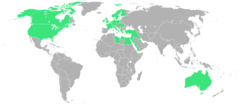
-
 Australia (4)
Australia (4) -
 Austria (31)
Austria (31) -
.svg.png) Belgium (16)
Belgium (16) -
 Bohemia (13)
Bohemia (13) -
 Canada (3)
Canada (3) -
 Denmark (53)
Denmark (53) -
.svg.png) Egypt (2)
Egypt (2) -
 Finland (4)[lower-alpha 1]
Finland (4)[lower-alpha 1] -
 France (56)
France (56) -
 Germany (49)
Germany (49) -
 Great Britain (47)
Great Britain (47) -
.svg.png) Greece (321)
Greece (321) -
.svg.png) Hungary (35)
Hungary (35) -
.svg.png) Italy (76)
Italy (76) -
 Netherlands (16)
Netherlands (16) -
 Norway (32)
Norway (32) -
 Ottoman Empire (2)[lower-alpha 2]
Ottoman Empire (2)[lower-alpha 2] -
 Sweden (39)
Sweden (39) -
 Switzerland (9)
Switzerland (9) -
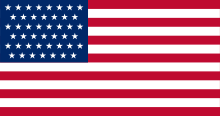 United States (38)
United States (38)
Medals awarded
78 events in 14 disciplines, comprising 12 sports, were part of the 1906 Games.
- Aquatics
 Athletics (21)
Athletics (21) _pictogram.svg.png) Cycling
Cycling
- Road (1)
- Track (5)
 Fencing (8)
Fencing (8)  Football (1)
Football (1) _pictogram.svg.png) Gymnastics (4)
Gymnastics (4)  Rowing (6)
Rowing (6)  Shooting (16)
Shooting (16)  Tennis (4)
Tennis (4)  Tug of war (1)
Tug of war (1)  Weightlifting (2)
Weightlifting (2)  Wrestling (4)
Wrestling (4)
Medal count
These medals were distributed but are no longer recognized by the International Olympic Committee.
In the table, the host country is highlighted.[1]
| Rank | Nation | Gold | Silver | Bronze | Total |
|---|---|---|---|---|---|
| 1 | | 15 | 9 | 16 | 40 |
| 2 | | 12 | 6 | 6 | 24 |
| 3 | | 8 | 13 | 13 | 34 |
| 4 | | 8 | 11 | 5 | 24 |
| 5 | | 7 | 6 | 3 | 16 |
| 6 | | 5 | 6 | 4 | 15 |
| 7 | | 4 | 6 | 5 | 15 |
| 8 | | 4 | 2 | 1 | 7 |
| 9 | | 3 | 3 | 3 | 9 |
| 10 | | 3 | 2 | 1 | 6 |
| 11 | | 2 | 5 | 7 | 14 |
| 12 | | 2 | 5 | 3 | 10 |
| 13 | | 2 | 1 | 3 | 6 |
| 14 | | 2 | 1 | 1 | 4 |
| 15 | | 1 | 1 | 0 | 2 |
| 16 | | 0 | 1 | 2 | 3 |
| 17 | | 0 | 1 | 0 | 1 |
| 17 | 0 | 1 | 0 | 1 | |
| 19 | | 0 | 0 | 3 | 3 |
| 20 | | 0 | 0 | 2 | 2 |
| Total | 78 | 80 | 78 | 236 | |
The mixed team medal is for Belgian/Greek athletes in the Coxed Pairs 1 mile rowing event. In the football event, the silver medal for the team from Smyrna was won by footballers from various nationalities (English, French and Armenian), while the bronze medal for the team from Thessalonica was won by ethnic Greeks competing for Greece, despite both cities being Ottoman possessions at the time.
The only country that did not win medals - Egypt.
See also
Notes
- ↑ The Grand Duchy of Finland was part of the Russian Empire at the time, but was treated as a separate nation.
- 1 2 At the 1908 Olympics, the name "Turkey" was used to refer to the Ottoman Empire.
References
- 1 2 3 "1906 Athina Summer Games". sports-reference.com. Retrieved 2014-01-29.
- ↑ Journal of Olympic History, Volume 10, December 2001/January 2002, The 2nd International Olympic Games in Athens 1906, by Karl Lennartz
- ↑ What Events are Olympic? Olympics at SportsReference.com. Accessed 7 Sep 2008.
- ↑ The Olympic games at Athens, 1906 by James E. Sullivan, American commissioner to the Olympic games. Published 1906.